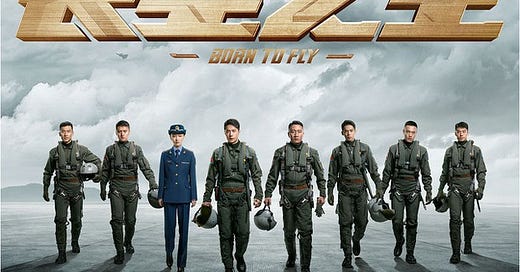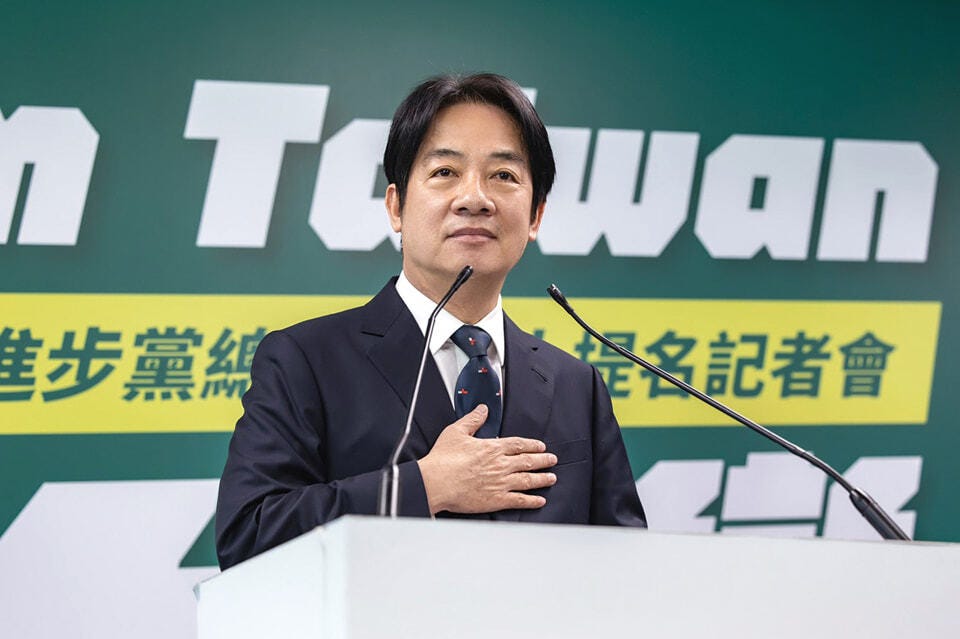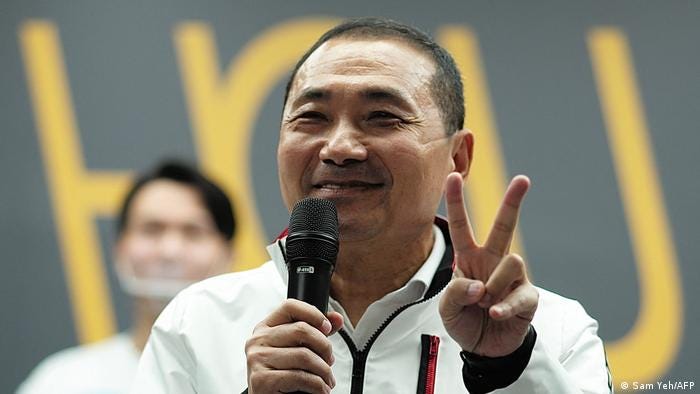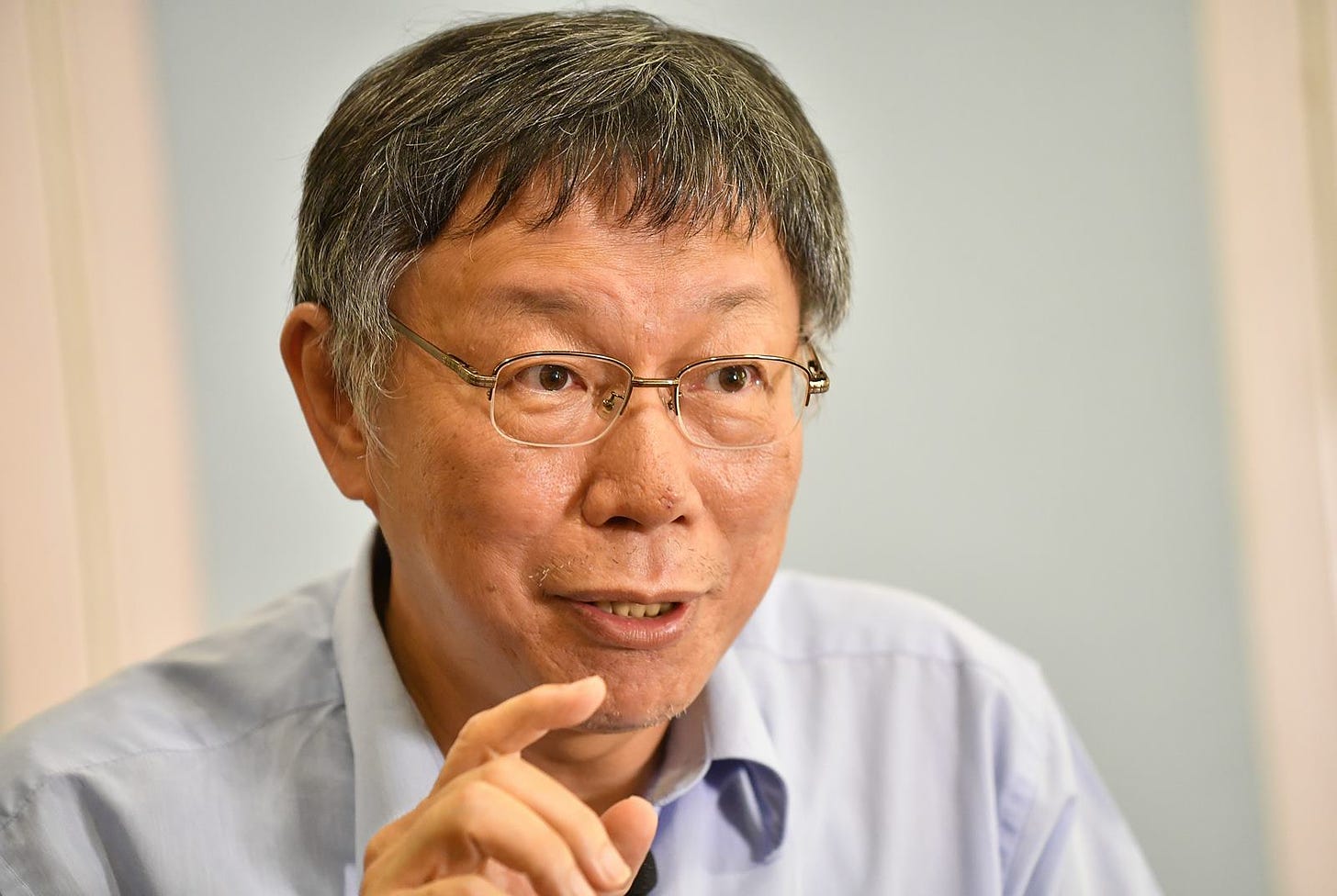China’s Top Gun: It’s No Maverick + 2024 Taiwan Election Slate Is Set!
Is China’s ripoff of Top Gun actually subversive? And a DPP vs TPP vs KMT Royal Rumble!
Below, we have a fun movie review and Taiwan election coverage. But first, I wanted to highlight a fantastic job opportunity from Ben Reinhardt, former ChinaTalk guest and creator of Speculative Technologies.
New technologies are stuck due to a complex logjam of uncertainty and incentives that keep a field from moving forward. His goal is to equip a class of “field strategists” with the tools to expedite the transition of technological concepts from “impossible” to “inevitable.”
For nine months, Spectech will support and mentor a small group of field strategists to identify:
Ideas (term used very broadly) in the “adjacent possible” of current knowledge and capabilities that people aren’t executing on or are executing on poorly
What work needs to happen in the short-term to “unlock” the idea.
At the end of the program, he’ll help field strategists go on to execute on the programs they have designed in one of several ways: spinning up a program within Speculative Technologies; joining another ARPA-like organization like ARIA or DARPA itself; or going further afield to start an FRO or a startup.
The cohort will start in early August. Applications close May 26. Do consider applying!
Justin Key Canfil—Born to Fly, China’s Top Gun, Doesn’t Measure Up
I love aviation movies, even the bad ones (remember Final Countdown?). So I scrambled for a chance to see Born to Fly 长空之王. And it was a wild ride.
Sure, it’s a propagandist ripoff of Top Gun — right down to the hotshot maverick lead, shirtless male fanservice, and Kenny Loggins–style leitmotif. And maybe that’s okay. Hollywood is equally guilty of ripping off foreign films. But in this case, it’s hard to tell whether the real goal of the filmmakers was a propaganda movie, a slapstick comedy, or a veiled critique of the People’s Liberation Army Air Force (PLAAF). Rather than a world-class air power, moviegoers are led to believe that the PLAAF is perhaps more of a danger to itself.
Besides its entertainment value, we might expect two things from a good propaganda movie:
At a minimum, it should embolden nationalists.
It could also go a step further by cowing its competitors.
I don’t know whether Born to Fly succeeds on the first — rumor has it that many Chinese veterans are upset with the movie (albeit its critics on Weibo and Xiaohongshu tend to get censored). On the second point, however, it totally backfires. Let’s put it this way: if there’s any truth at all to the movie, “China hawks” in the US can finally relax.
The movie proceeds from a basic premise: to repel “hostile nations” from the South China Sea, the PLAAF plans to build a fifth-generation stealth fighter. A foreign “technology blockade,” however, prevents the PLAAF from acquiring high-tech aircraft engines (echoing longstanding challenges to China’s indigenous engine program). So it sets out to build its own — and only an elite cohort of test pilots can gather the requisite performance data.
But the movie itself is not about “revenge” against China’s “enemies,” per se. Indeed, engagement with US forces occurs only at the very end, lasting fewer than five minutes. Instead, the pilots spend the other 123 minutes battling their own faulty equipment.
The movie goes off the rails early on, with pilot selection. The candidates — “the best of the best” — are essentially sent back to bootcamp, where they are subjected to a bizarre series of tests, including their ability to withstand extreme temperatures, do Crossfit WODs (I hope you like battle-rope montages!), cross something that looks like the Zhangjiajie Glass Bridge, fight off CGI attack dogs, and even fly their planes blindfolded. No one passes any of these tests, but a handful are selected anyway.
At first, our protagonist, the lead pilot (played by boyband member Wang Yibo 王一博), shows more interest in tinkering with spare parts in his dorm than flying experimental planes. The higher-ups have to plead with him to accept the role. Their pitch? He’ll get to fly a stealth fighter. Spoiler: he never steps foot into one until the end of the movie. The first plane he’s assigned is a trainer jet. He promptly ejects at the first sign of trouble, leaving his copilot (slash boss) behind. His commanders are angrier at him for failing to safeguard the test data — which is recorded on a literal floppy disk — than almost killing two people or losing his plane. He is grounded, but soon reinstated after learning a hamfisted lesson about “every life mattering” and “sacrificing for the greater good.”
The bulk of the movie’s plot revolves around efforts to install a drag chute that will let the pilots intentionally put their aircraft into deadly spins. Pilots are told that whatever data they get from purposely exiting the flight envelope will mean the difference between “life and death on the battlefield.” The team simply cannot get the chute to work. They even put it on a truck to test it. The truck flips. When they finally do get the chute to function, they can’t figure out how to jettison it. Several aircraft are lost.
Nor does the film dwell solely on pilot error or harebrained tactics. Their airframes (mostly J-11s or J-16s) fare no better. Engines repeatedly flame out. Missiles get stuck on their hardpoints. One plane almost crashes into an elementary school, the only structure for miles around. There are at least three ejections. Later, when a pilot pulls the ejection handle out of necessity, nothing happens. A bird strike shatters a canopy, knocking two aviators unconscious. In one scene, everyone huddles together around crumpled aircraft wreckage, looking despondent.
Meanwhile, the pilots spend almost no time testing the aircraft for which their high-tech engine is actually designed. China’s new J-20 hardly appears until the end, and the J-31 never does. As for the planes we do see, one can only wonder why elite test pilots have been assigned to airframes that were first introduced a quarter century ago — and why none of these seem airworthy.
This was honestly the most puzzling part about the movie — at least Top Gun: Maverick offers moviegoers a (technically implausible) reason why F-35s can’t be used for the mission, or for why the ejection seat on Tom Cruise’s legacy F-14 might no longer work — but being put in planes that fall apart midair is certainly one way for your best pilots to ride into the danger zone.
One nice thing about seeing this movie in Hong Kong was that it was possible to order beer at theater concessions. We certainly needed it. If you like drinking games, take a sip every time chief engineer Wei (played by the acclaimed Tian Zhuangzhuang 田壮壮) cradles his face in his hands in despair. Actually, while you’re at it, try this anytime the whole cast weeps in unison. In light of the film’s hypermasculine script (“Real men wear scars…”) and its shamefully antiquated portrayal of women (at least Top Gun didn’t fail the Bechdel test at every turn), the squadron’s exaggerated blubbering was a refreshing reminder that even macho fighter jocks should try to stay in touch with their feelings.
Although critics invariably describe Born to Fly as “China’s answer to Top Gun,” the film nonetheless strikes some original chords. Volleyball is replaced with soccer: audiences are subjected to endless shots of the commander’s son juggling a soccer ball, and the film concludes with a soccer stadium flyover — all clearly a nod to President Xi’s ambitions for China in the World Cup. Because of the test-pilot theme, some have compared it to The Right Stuff (though that is a genuine masterpiece about real historical events). It’s admittedly more than merely “Top Gun with Chinese characteristics.” Still, both thematically and stylistically, the parallels with “Top Gun” are hard to ignore — and to be clear, no one’s saying that’s a bad thing.
For aviation geeks, “China’s answer to Top Gun” has its moments. There are still some cool flight scenes. As far as I know there is little authentic aerial footage, but the CGI seemed, at least to me, reasonably aesthetic (even if the physics are a little dubious). Moreover, Hu Jun 胡军 (who plays commander Zhang Ting) and Tian Zhuangzhuang are serious actors, even if cast in unserious roles. I agree it’s certainly a cut above the 2017 helicopter action flick Sky Hunter 空天猎, which the South China Morning Post called “risible” and “little more than a recruitment drive for the Chinese military.” I had fun watching it, and the audience enjoyed some laughs.
On the surface, the movie joins the push in China for nationalistic movies that embrace the “dare to struggle” (敢于斗争) political concept, now in vogue. By the end of the story, the pilots finally get their new engine to work and use it to shoot down some unmarked US Navy drones within the nine-dash line, mercifully allowing the F-35s to escape. Overcoming foreign technology sanctions is also a major theme. More than once, the movie references how China’s atomic bomb had been “built from nothing.” I recalled an anecdote in Liu Cixin’s book Ball Lightning 球状闪电 when one character tells another how China’s founding navy managed to sink an enemy destroyer with wooden boats. True or not, autarky is central to the film’s narrative, and it fits as technology sanctions mount.
On a deeper level, it’s hard not to read dark political satire into the film. Early on, the pilots are taken on a pilgrimage to visit a cemetery in remote Xinjiang, which houses the graves of hundreds of dead test pilots. Without spoiling the movie, a few more pilots are added to the graveyard before anyone gets their engine. After ejecting a second time, the lead pilot (Wang) is almost killed when he’s dragged by his parachute, in dramatic slow motion, through a pile of corn cobs. His parents come to visit him after he’s released from the hospital, but they disown him when he insists on getting back into the cockpit (to crash again, we can only presume). We are shown the cemetery twice more, and as the credits roll, embarrassingly fake mayday recordings play (“Honey, it’s the end, I can’t make it home … name our son ‘August 1st’ [PLA Day]!”).
Despite some jingoistic basetags and an ostensibly serious tone, the movie is more Hot Shots! than Top Gun. Arguably, and perhaps inadvertently, the film flies in the face of its benefactors in the PLAAF. Without being overtly critical of the PLAAF (think Mister Roberts, not Paths of Glory), the movie pays tribute to a silent generation of Chinese test pilots. It does so in spite of itself — not by accurately portraying their sacrifices or achievements, but rather by parodying a military organizational system that, at least according to the movie, may have killed many of them in vain.
Perhaps this is why the PLAAF was reportedly disappointed with the film despite having supported its production. The release date, originally on the eve of China’s National Day, was inexplicably delayed at the eleventh hour. From appearances, it also seems the writers didn’t get much technical input at all from the Chinese military.
This is just a movie review. But I think the movie gravely understates the PLAAF’s competence. China’s air force is professional, technologically competent, increasingly formidable, and probably not the joke the movie makes it out to be.
It’s still worth it to watch this movie if you like jets, parodies, or parodies about jets. The greatest movies often leave you wondering about the ending for hours or days after the credits roll. In this case, I have spent these past few days wondering whether or not the parody I saw was intentional.
Nicholas—Taiwan 2024: The Slate Is Set!
Taiwan’s presidential election day is slated for Saturday, January 13, 2024, and the winner will be inaugurated four months later, on Monday, May 20. Here’s how the frontrunners are looking:
Democratic Progressive Party 民主進步黨 (DPP): Lai Ching-te
There was no doubt that Lai Ching-te 賴清德 — who is currently serving as the vice president of Taiwan, under Tsai Ing-wen 蔡英文 — would be the DPP’s nominee. He became the chairman of the DPP last year, as he was the only candidate running. And last month, Lai was the only candidate to run in the DPP’s presidential primary.
Lai has had somewhat of a remarkable political career lately. Beginning in 2017, he served in the Tsai administration as Premier. (Taiwan’s executive branch is a bit funky: technically, the premier — not the president — is the head of the Executive Yuan, but the premier is appointed by and serves at the will of the president. So although the premier holds powers the president doesn’t, those powers are exercised in practice only inasmuch as she or he acts as an agent of the president’s wishes.)
But in 2019, Lai mounted a direct challenge to Tsai’s reelection by registering in the DPP presidential primaries. Tsai defeated Lai in the primary — but then asked Lai to join her on her ticket as vice president. That kind of unity no doubt played a role in the Tsai-Lai duo’s landslide victory in 2020.
Kuomintang 國民黨 (KMT): Hou Yu-ih
The big news of the week is that Hou Yu-ih 侯友宜, currently the mayor of New Taipei City, was selected as the KMT’s nominee for president. A former cop and Director-General of Taiwan’s National Police Agency, Hou is described by many as a moderate — for instance, he has rejected calls for Taiwan independence as well as the PRC’s “One Country, Two Systems” unification proposal.
The KMT’s primaries were run differently this time around: as reported in Liberty Times 自由時報, the KMT leadership, chaired by Eric Chu 朱立倫, replaced open-primary elections with a direct nomination process. Hou’s selection by Chu was somewhat anticipated: indeed, when Chu was mayor of New Taipei City from 2016 to 2018, he appointed Hou as his Deputy Mayor.
In passing over primary voters, Chu blocked the possible nomination of billionaire and Foxconn founder Terry Gou 郭台銘, who has been compared by various media as Taiwan’s Donald Trump and who many saw as an uncompetitive candidate due to his business and political ties to the mainland. (There’s an idea for US Republican primaries!)
To his credit, Gou has since congratulated Hou for his nomination. (Also to his credit: after BioNTech lawyers struggled for months to produce a contract to sell vaccines to the Taiwan government without offending the PRC’s “one-China principle,” Gou purchased 15 million vaccines personally and then donated them to the Taiwanese populace.)
Taiwan People’s Party 台灣民眾黨 (TPP): Ko Wen-je
Per Article 22 of the Presidential and Vice Presidential Election and Recall Act, parties that pass the five-percent vote threshold can put a candidate on the general ballot — meaning the TPP and the New Power Party 時代力量 (NPP) are eligible as well.
On May 17, Ko Wen-je 柯文哲 — the TPP’s founder and former mayor of Taipei — was nominated as the party’s candidate. Like Lai, Ko was the only one seeking the TPP nomination.
The TPP is a very new political party, established in 2019, and brands itself as being neither “pan-Blue” (ie. KMT-aligned) nor “pan-Green” (ie. DPP-aligned). As Joe Bauer writes for the Global Taiwan Institute:
While it is certainly possible that Ko can fine-tune his approach to attract moderates from both the Blue and Green camps in the years to come, it remains just as likely that he could instead play the role of a third-party spoiler, siphoning away a small but significant portion of the vote from either of the leading party’s candidates.
Such third-party spoiling is much more likely to occur in Taiwan than in the US because a candidate need not a hard majority to win the presidency. For example, in the 2000 presidential elections, a rift between KMT nominee Lien Chan 連戰 and James Soong 宋楚瑜 — who was expelled from the KMT for announcing his candidacy as an independent after losing the KMT’s nomination — allowed Chen Shui-bian 陳水扁 of the DPP to win the election with just over thirty-nine percent of the vote. Lien and Song together garnered nearly sixty percent of the popular vote, meaning the KMT likely could have won had it been unified (hence the significance of Gou’s congratulating Hou).






